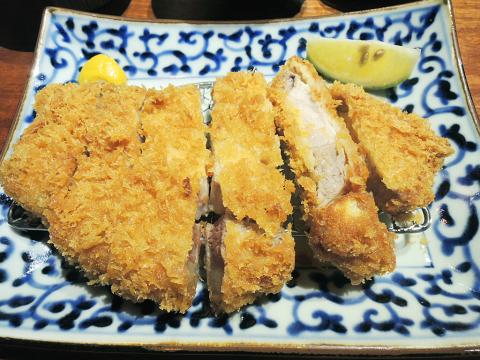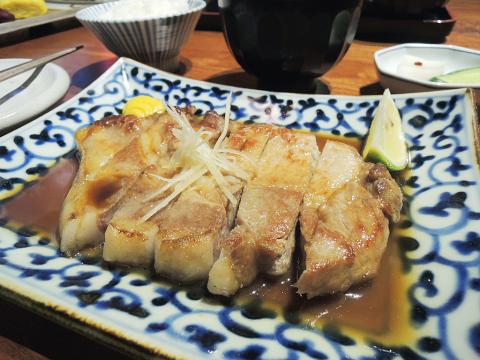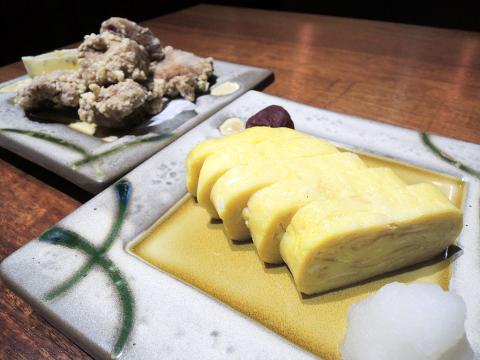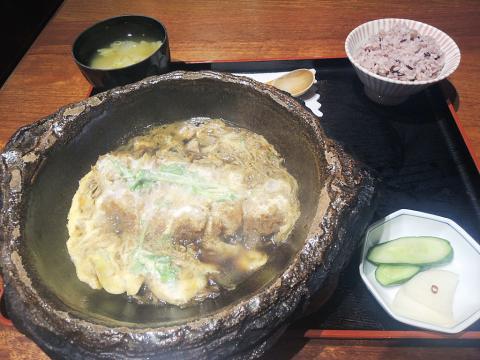Japan’s Wagokoro Tonkatsu Anzu Ginza, formerly known as Wagokoro Tonkatsu Anzu (“Ginza” was added after it partnered with Taiwan’s La Kaffa International Co [六角國際事業]), has earned a justified reputation for its tonkatsu, or deep-fried pork chops.
My friend and I visited the Zhongxiao branch (忠孝店), located inside the Bistro 98 building and a three-minute walk from the Zhongxiao Fuxing MRT Station (忠孝復興站), for dinner on a weekday a few weeks ago. We were promptly seated at a window table with views of the area’s bustling streets, which served as a nice contrast to the interior’s soft lighting and relaxing atmosphere.
The majority of the items on Anzu Ginza’s menu are set dishes that come with regular or purple rice, pickled vegetables, shredded lettuce and cabbage with purple perilla or pomelo sauce and miso soup. There are nine takeout options (NT$200 to NT$270) as well as pork and shrimp sandwiches (NT$130 each).

Photo: Eddy Chang, Taipei Times
We began with the six-egg Japanese egg roll (古早味玉子燒, NT$120). It was infused with light hints of soy sauce and was a nice balance between sweet and savory. This was followed up by the fried chicken pieces (炸雞塊, NT$100 for 6), slightly crispy on the outside and moist and juicy inside.
According to Anzu Ginza’s branch manager Irene Chiu (邱文萱), the restaurant’s cutlets are aged for seven days, nicely tenderizing them and giving them an intense flavor. The toro loin (TORO里肌肉套餐, NT$450/NT$370) is the restaurant’s signature dish. Though the Japanese word “toro” means fish belly, it is here synonymous with high quality. The large piece of breaded pork loin — which weighs 250g and is 3cm thick — is deep-fried until golden and crispy. As it contains more marbling than the other cuts on the menu, it’s juicier and more flavorsome. This is a must try for all pork chop-maniacs.
The pork loin pot (里肌豬排鍋膳套餐, NT$330/NT$250) is the restaurant’s most popular dish. Unlike conventional tonkatsu, this deep-fried pork loin arrives in a large pot and is topped with stir-fried onion slices and a simmered egg partially soaked in a broth. This creates a harmonious combination of flavors and textures between the bottom part of the pork loin, which is infused with the soup, and the top, which remains slightly crisp.

Photo: Eddy Chang, Taipei Times
If you are not a fan of deep-fried foods, the pan-fried pork loin with shredded ginger (生薑燒厚切里肌豬排, NT$350/NT$270) is a good option. The thickly-sliced meat is pan-fried and then stewed in a ginger and garlic sauce until the sauce is completely reduced. Its flavor remains robust, while being significantly less greasy than its deep-fried counterparts.
Other popular dishes include the Anzu special (杏子招牌特餐, NT$330/NT$250), including pork cutlets and shrimp, vegetable roll and steamed egg, and the grass shrimp and pork fillet (草蝦腰內豬排套餐, NT$350/NT$270).
Anzu Ginza has a minimum charge of NT$80 for all guests above 6 years old, and reservations are available at some branches. But the 90-minute time limit may be too short. Overall, Anzu Ginza is a satisfying dining experience, and its authentic Japanese cutlets are irresistible.

Photo: Eddy Chang, Taipei Times

Photo: Eddy Chang, Taipei Times

Most heroes are remembered for the battles they fought. Taiwan’s Black Bat Squadron is remembered for flying into Chinese airspace 838 times between 1953 and 1967, and for the 148 men whose sacrifice bought the intelligence that kept Taiwan secure. Two-thirds of the squadron died carrying out missions most people wouldn’t learn about for another 40 years. The squadron lost 15 aircraft and 148 crew members over those 14 years, making it the deadliest unit in Taiwan’s military history by casualty rate. They flew at night, often at low altitudes, straight into some of the most heavily defended airspace in Asia.

Beijing’s ironic, abusive tantrums aimed at Japan since Japanese Prime Minister Sanae Takaichi publicly stated that a Taiwan contingency would be an existential crisis for Japan, have revealed for all the world to see that the People’s Republic of China (PRC) lusts after Okinawa. We all owe Takaichi a debt of thanks for getting the PRC to make that public. The PRC and its netizens, taking their cue from the Chinese Communist Party (CCP), are presenting Okinawa by mirroring the claims about Taiwan. Official PRC propaganda organs began to wax lyrical about Okinawa’s “unsettled status” beginning last month. A Global

Taiwan’s democracy is at risk. Be very alarmed. This is not a drill. The current constitutional crisis progressed slowly, then suddenly. Political tensions, partisan hostility and emotions are all running high right when cool heads and calm negotiation are most needed. Oxford defines brinkmanship as: “The art or practice of pursuing a dangerous policy to the limits of safety before stopping, especially in politics.” It says the term comes from a quote from a 1956 Cold War interview with then-American Secretary of State John Foster Dulles, when he said: ‘The ability to get to the verge without getting into the war is

Like much in the world today, theater has experienced major disruptions over the six years since COVID-19. The pandemic, the war in Ukraine and social media have created a new normal of geopolitical and information uncertainty, and the performing arts are not immune to these effects. “Ten years ago people wanted to come to the theater to engage with important issues, but now the Internet allows them to engage with those issues powerfully and immediately,” said Faith Tan, programming director of the Esplanade in Singapore, speaking last week in Japan. “One reaction to unpredictability has been a renewed emphasis on